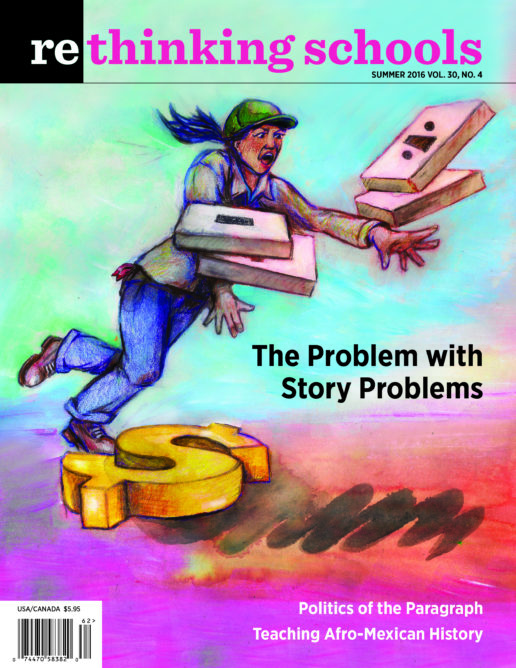Letters to the Editor 30.4
Personal Cost of War
I just finished my second reading of Chris Hawking’s, “Cracking the Box: The Personal Cost of War”(winter 2015-16). Both times his story literally brought tears to my eyes: first, because of the personal tragedy he endured and continues to endure; and second, because of his courageous teaching. I suspect that he has been criticized for a lack of patriotism, for deviating from the prescribed curriculum, or for being a “peacenik.” What is clear to me is that Mr. Hawking provides his students with a critical knowledge base enabling them to be what our society so desperately needs—informed citizens. What more important knowledge can citizens possess when they are deciding whether or not to support political leaders who propose another and another and another military action in “defense of freedom,” to rid the world of “bad guys,” or to maintain our leadership position in the world? Thank you, Rethinking Schools, for continuing to publish articles like this that highlight the depth of commitment teachers bring to their classrooms day after day.
Tom Grotelueschen
Cocoa Beach, Florida
Chris Hawking wrote a powerful piece. Too often war is presented as only lots of facts, generally about a long time ago. Hawking eloquently describes how ambivalent our culture is about war. And he points out that schools may present some of the evils of war at one moment and spotlight military recruiters the next.
Schools by law must allow military recruiters the same access that college recruiters and employers have to students. But that is all that is required: the same access, not more. Too often schools give much more space to military recruiters than college recruiters, and more than is given to alternate points of view (see “Reining in Military Recruiting,” spring 2016).
Hawking’s article was an affirmation for us here in Lane County, Oregon. Our Truth in Recruiting program goes into all the public high schools in our county to present facts the recruiters leave out. Our speakers are military veterans who talk from personal experience about the costs of combat for the very reason Hawking is so honest with his students: The true human cost of war is not just about facts and it is not glorious.
I hope this article can indeed move our culture toward peace by understanding all the costs of war.
Carol Van Houten
Coordinator, Truth in Recruiting
Community Alliance of Lane County
Eugene, Oregon
Educators and Palestine
I wish to commend Rethinking Schools for their editorial on “Boycotting Occupation: Educators and Palestine” (spring 2016). In today’s society, it is very difficult to approach the problems faced by Palestinians in Israel and Palestine without universal condemnation and claims of anti-Semitism. Just the openness to talk about it has often been detrimental to one’s employment or career.
However, things are slowly changing. We are seeing more and more institutions openly supporting BDS (the movement to boycott, divest from, and sanction Israel in support of Palestinian rights) without fear of recriminations. Educational institutions are at the forefront as we represent a more universalist approach to world problems.
As ESOL (English for speakers of other languages) teachers, whether we have Palestinians in our class or not, there’s the highest likelihood that many of our students have suffered some form of trauma that brought them to our classroom—in the United States or in another welcoming country. We see firsthand how the trauma of war and occupation affects our students. As professionals as well as simply humans, we wish to do something. For some, it’s supporting open borders. For others, it’s going after the root causes of trauma, notably in this case through BDS.
As teachers we are advocates for the dispossessed who flock to our classrooms. We are often the only real source of institutional support in their lives. If we cannot help a person in distress, we look for ways to reach out and show support. BDS is one example, as we see the assault on education in Palestine by the forces of a European colony wishing to maintain dominance in all forms: education, culture, history, military.
Myles Hoenig
Chair, Social Responsibility Interest Section
TESOL (Teachers of English to Speakers of Other Languages)
Baltimore, Maryland
Education in East Jerusalem
As an educator who lived and worked in Palestine, I applaud you for presenting how the Israeli occupation impacts the delivery of education in East Jerusalem (“Education Under Occupation: An Interview with Zakaria Odeh,” spring 2016). The reality for children whose fundamental human rights are constantly threatened is not just troubling, but also highlights the many layers of violence that inform the Palestinian experience.
Hopefully, finding a solution to the Israeli-Palestinian conflict involves the recognition that social justice, security, and dignity for all Palestinians begins with dismantling Israeli apartheid and ending the occupation. In spite of my support for the BDS movement, I have requested that my name be withheld from this letter for fear of reprimand from my employer. Sadly, we live in a political climate where support for Palestinian human rights is slandered as anti-semitism, which speaks to the importance of Rethinking Schools balancing out the often one-sided support for Israel.
Name withheld on request
Toronto

